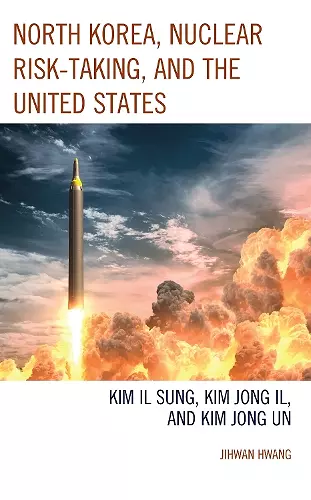North Korea, Nuclear Risk-Taking, and the United States
Kim Il Sung, Kim Jong Il, and Kim Jong Un
Format:Hardback
Publisher:Bloomsbury Publishing PLC
Published:21st Nov '23
Currently unavailable, and unfortunately no date known when it will be back

Jihwan Hwang analyzes Pyongyang’s nuclear policy changes over the last three decades under Kim Il Sung, Kim Jong Il and Kim Jong Un. Why did a weaker North Korea take the risk of standing up against the much stronger U.S. with its nuclear weapons program, even escalating the crisis to the point of a war? Later, why did North Korea change its course of action amid the crisis even though the security environment remained essentially the same? Hwang draws on the main tenets of prospect theory in international relations and argues that Pyongyang becomes either risk-acceptant or risk-averse toward the U.S., depending on the situation it faces. When Pyongyang perceived the status quo to be deteriorating, it framed its situation as a loss and chose a risk-acceptant of confrontation to restore the status quo. Equally, when Pyongyang perceived the situation to be improving, it chose a risk-averse engagement in the domain of gain. In contrast, when Pyongyang perceived an extreme loss such as military confrontation against the United States, it would rather choose a risk-averse policy to avoid the catastrophic outcome of war. The issues of risk are central to an understanding of Pyongyang’s nuclear policy decision-making.
In this outstanding and original book, Hwang analyzes North Korea’s nuclear diplomacy under three leaders during the nuclear crises on the Korean peninsula since the early 1990s. He challenges the realist and liberal approaches dominating scholarly and policy discourses and offers an alternative approach based on prospect theory. The book argues that North Korea’s leaders are risk-acceptant or risk-averse according to their perception of gains and losses in international and domestic environments. As a result, North Korea has moved between engagement and confrontation with the US when its supreme leader has perceived North Korea's security predicament to be deteriorating. Hwang explains why Kim Il Sung changed North Korea's nuclear policy from confrontation to engagement (risk-aversion), signing the June 1994 Agreed Framework with the US. The second nuclear crisis under Kim Jong Il witnessed a sharp change in nuclear policy from confrontation (withdrawal from the Non-Proliferation Treaty) to engagement (Six-Party Talks) back to confrontation. Lastly, Hwang discusses North Korea's nuclear risk-taking attitudes under Kim Jong Un, including the failed summits with the US and the return to a confrontation policy toward the US. A useful addition to Jun Taek Kwon and Weiqi Zhang's Strategies of Survival (CH, Apr'24, 61-2307). Highly recommended. Advanced undergraduates through faculty; practitioners. * Choice Reviews *
North Korea's nuclear program is arguably one of the most contentious issues facing the world. Jihwan Hwang applies prospect theory with great skill and verve to illuminate the many changes in Pyongyang's stance on this issue over the past three decades. He offers an insightful explanation of this phenomenon as North Korea's leaders respond to their changing domestic and international circumstances. His comprehensive account should be of interest to all those who are interested in the topics of nuclear proliferation and Northeast Asia's stability. -- Steve Chan, College Professor of Distinction, Emeritus, University of Colorado, Boulder
“In this book, Hwang masterfully analyses the evolution of North Korea's nuclear policy throughout its history and all day to the present. Highly recommended.” -- Ramon Pacheco Pardo, King's College London
In North Korea, Nuclear Risk-Taking, and the United States, Professor Jihwan Hwang examines the enigma of North Korean nuclear diplomacy from the 1990s to the present under three different rulers of the Kim family regime. Drawing on insights from prospect theory to explain North Korea’s risk-taking behavior, Professor Hwang offers a unique analysis to a vexing security problem that will be of great value and interest to scholars and policy practitioners alike. -- Andrew Yeo
The reasons for the constant shifts in North Korea's nuclear policy have been the subject of much unfruitful debate that has yielded few real answers. Jihwan Hwang's systematic study of North Korea's nuclear policy since the end of the Cold War offers some critical insights into this problem. He carefully explains how an array of internal and external factors have prompted shifts in North Korea's policy over the years. It is a clearly-written and incisive manuscript that needs to be read by anyone with a serious interest in understanding North Korea's seemingly unexplainable behavior. -- Gregg Brazinsky, The George Washington University
“Hwang Jihwan masterfully assesses the balance of influence between external and internal factors that have shaped the risk assessments of three generations of North Korean leaders in the ongoing nuclear confrontation with the United States. The study provides useful and nuanced insights that should be of interest to both scholars and policymakers on why and when North Korea has changed course from confrontation to engagement and back again.” -- Scott Snyder, Co-editor, North Korea’s Foreign Policy: The Kim Jong Un Regime in a Hostile World
- Winner of Outstanding Academic Title 2024
ISBN: 9781793650269
Dimensions: 236mm x 157mm x 25mm
Weight: 517g
216 pages